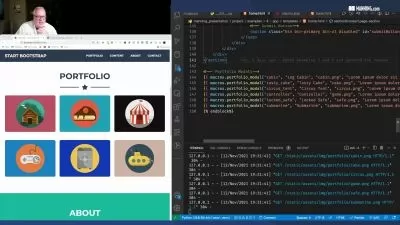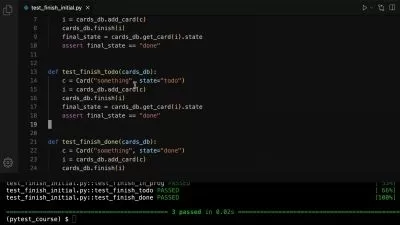Micro Learning | Best Practices for Python Beginners
CloudMatrix Learning
43:20
Description
Mastering Python Fundamentals: Bite-Sized Lessons for Clean, Efficient, and Professional Code
What You'll Learn?
- Writing Readable and Pythonic Code
- Effective Code Organization and Structure
- Proper Documentation and Commenting
- Efficient Use of Python's Built-in Features and Libraries
- Error Handling and Debugging Techniques
- Code Testing and Quality Assurance
- Version Control with Git
- Virtual Environments and Dependency Management
- Performance Optimization and Profiling
- Community Engagement and Continuous Learning
Who is this for?
What You Need to Know?
More details
DescriptionBest Practices for Python Beginners
Welcome to "Best Practices for Python Beginners"! This comprehensive course is designed to help you build a strong foundation in Python programming by focusing on industry-standard best practices and coding conventions.
Course Overview: In this course, you'll learn how to write clean, efficient, and maintainable Python code. We'll cover a wide range of topics, from basic coding principles to more advanced concepts, all aimed at helping you develop good coding habits from the start.
What You'll Learn:
Writing Readable and Pythonic Code
Effective Code Organization and Structure
Proper Documentation and Commenting
Efficient Use of Python's Built-in Features and Libraries
Error Handling and Debugging Techniques
Code Testing and Quality Assurance
Version Control with Git
Virtual Environments and Dependency Management
Performance Optimization and Profiling
Community Engagement and Continuous Learning
Course Structure: The course is divided into modules, each focusing on specific best practices. You'll start with fundamental concepts and progressively move to more advanced topics. Each module includes:
Theoretical explanations
Practical examples and code snippets
Hands-on exercises
Quizzes to test your understanding
Who This Course Is For: This course is ideal for:
Beginners who have basic Python knowledge and want to improve their coding skills
Self-taught programmers looking to adopt professional coding standards
Students transitioning from academic to professional Python programming
Prerequisites:
Basic understanding of Python syntax and core concepts
Familiarity with a Python development environment
By the end of this course, you'll have the skills and knowledge to write professional-grade Python code, following best practices that will set you apart in the programming world. Let's get started on your journey to becoming a proficient Python programmer!
Who this course is for:
- Beginners who have basic Python knowledge and want to improve their coding skills
- Self-taught programmers looking to adopt professional coding standards
- Students transitioning from academic to professional Python programming
Best Practices for Python Beginners
Welcome to "Best Practices for Python Beginners"! This comprehensive course is designed to help you build a strong foundation in Python programming by focusing on industry-standard best practices and coding conventions.
Course Overview: In this course, you'll learn how to write clean, efficient, and maintainable Python code. We'll cover a wide range of topics, from basic coding principles to more advanced concepts, all aimed at helping you develop good coding habits from the start.
What You'll Learn:
Writing Readable and Pythonic Code
Effective Code Organization and Structure
Proper Documentation and Commenting
Efficient Use of Python's Built-in Features and Libraries
Error Handling and Debugging Techniques
Code Testing and Quality Assurance
Version Control with Git
Virtual Environments and Dependency Management
Performance Optimization and Profiling
Community Engagement and Continuous Learning
Course Structure: The course is divided into modules, each focusing on specific best practices. You'll start with fundamental concepts and progressively move to more advanced topics. Each module includes:
Theoretical explanations
Practical examples and code snippets
Hands-on exercises
Quizzes to test your understanding
Who This Course Is For: This course is ideal for:
Beginners who have basic Python knowledge and want to improve their coding skills
Self-taught programmers looking to adopt professional coding standards
Students transitioning from academic to professional Python programming
Prerequisites:
Basic understanding of Python syntax and core concepts
Familiarity with a Python development environment
By the end of this course, you'll have the skills and knowledge to write professional-grade Python code, following best practices that will set you apart in the programming world. Let's get started on your journey to becoming a proficient Python programmer!
Who this course is for:
- Beginners who have basic Python knowledge and want to improve their coding skills
- Self-taught programmers looking to adopt professional coding standards
- Students transitioning from academic to professional Python programming
User Reviews
Rating
CloudMatrix Learning
Instructor's Courses
Udemy
View courses Udemy- language english
- Training sessions 43
- duration 43:20
- Release Date 2024/08/11









